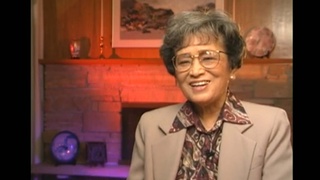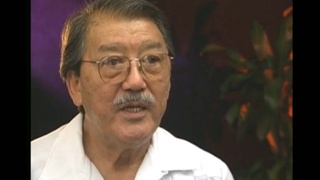Interviews
Signing of the bill
Then we were all at the Seattle JACL convention in 1988, and we got word that tomorrow morning, President's going to sign the bill. "He's going to sign the bill?" And we're all sitting in Seattle. So everyone makes airplane reservations, and we called the White House and said, "He can't just sign the bill, this has to be a public ceremony. And we'll all fly out and we'll get everyone there." So they said, "Okay, we'll make it a signing ceremony," and they said, "We'll do it at," I don't know, "eleven o'clock in the morning."
So everyone was flying, just racing around trying to get reservations on the airplane to get from Seattle, Washington, to Washington, D.C. Everyone was going on the red-eye, and we all get to the White House and we're all bleary eyed, and we're all there watching the ceremony that President Reagan signed the bill.
There's a picture of the President signing the bill, and so I was saying to Pat Saiki, I said, "Hey Pat, look at that signature there." Because that was my signature on the bill as Speaker pro tem on what they called the red line copy of the bill that the President signs. Because it was Sparky Matsunaga as President pro tem of the U.S. Senate, me as Speaker pro tem of the U.S. House, and then President Reagan with him signing the bill. And I thought, where else but only in a country like the United States could this, something like this happen?
Date: July 4, 2008
Location: California, US
Interviewer: Tom Ikeda
Contributed by: Watase Media Arts Center, Japanese American National Museum
Explore More Videos

The unheralded help from beyond the community
(1917 - 2004) Political activist


Need for Monetary Compensation
(1923–2008) One of the leaders behind the redress movement.

Erasing the Bitterness
(1923–2008) One of the leaders behind the redress movement.



Why I joined the Japanese American Citizens League
Judge, only Japanese American to serve on CWRIC.

Figuring out a dollar amount for redress
Judge, only Japanese American to serve on CWRIC.

On hearing of CWRIC selection from Senator Inouye
Judge, only Japanese American to serve on CWRIC.

Rationale for rejecting redress payment
Judge, only Japanese American to serve on CWRIC.



Appointing John Tateishi as National JACL Redress Chair
(1917 - 2004) Political activist

Inouye’s strategy for educating the American public
(1917 - 2004) Political activist

Recalling President Carter’s signing of the Commission bill
(1917 - 2004) Political activist
